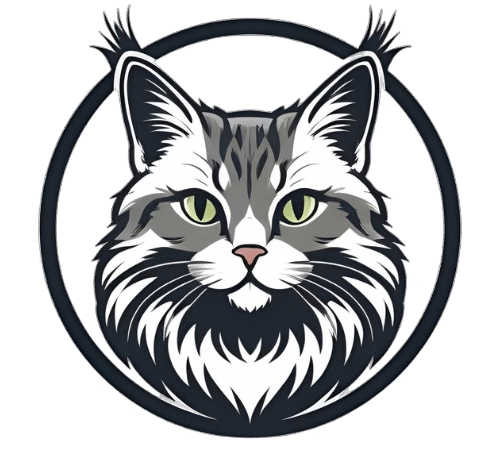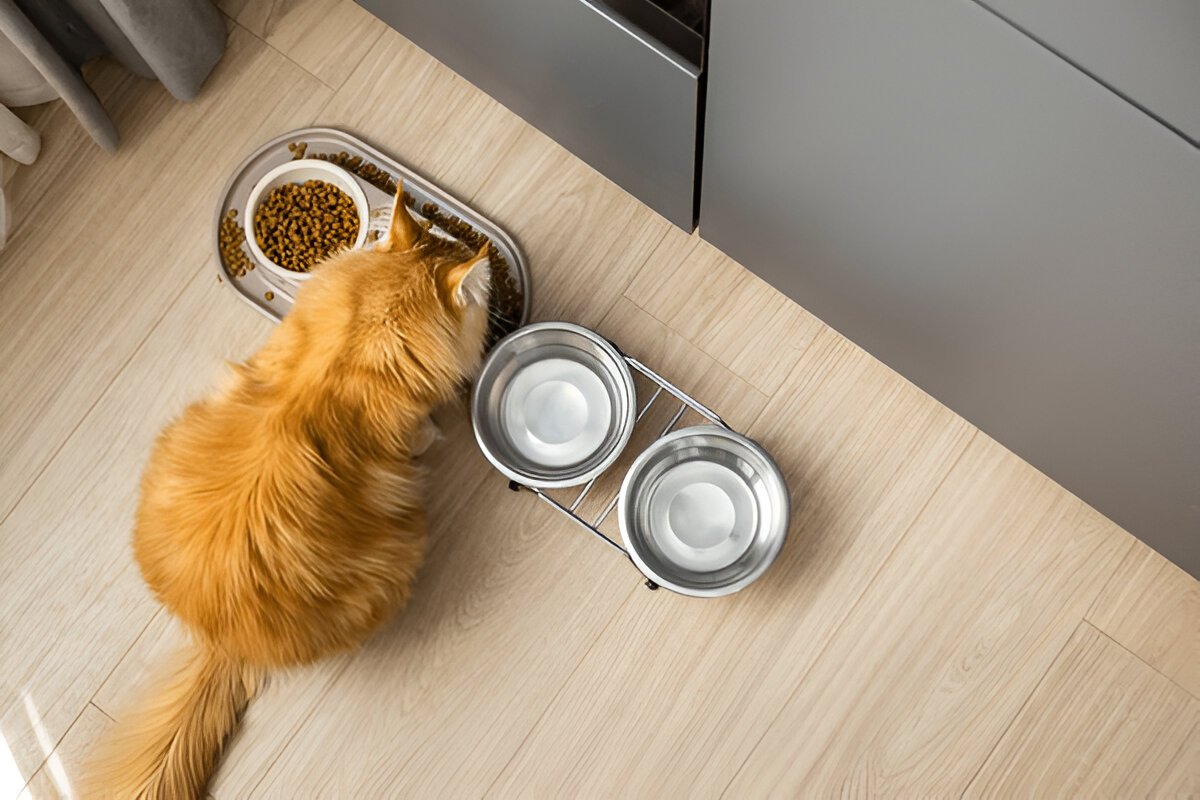As a proud Maine Coon owner, I’ve learned that feeding these gentle giants isn’t just about filling a bowl—it’s about nourishing a powerhouse of energy, affection, and mischief.
but the question is what do Maine Coon cats eat?
Maine Coons are unique, not just in size and personality, but in their dietary needs.
Here’s my journey and insights into what keeps my Maine Coon thriving, plus some expert-backed advice and a few quirky facts.
- 1. The Maine Coon Diet: Not Just “Cat Food”
- 2. Protein: The Foundation of Every Maine Coon Meal
- 3. Fats: Why Fats Matter for Maine Coon Cats
- 4. Carbs and Fiber: The Supporting Cast
- 5. Hydration Is the Ultimate Super Nutrient
- 6. DIY Diets and Homemade Meals
- 7. Portion Control Tips for Maine Coons
- Final Thoughts
- Maine Coon Diet FAQs
1. The Maine Coon Diet: Not Just “Cat Food”
Some animals need to eat meat to survive. Maine Coons are obligate carnivores, which means their bodies are built to thrive on meat, not grains or veggies.
Many people think any kibble is fine, but these cats need proper animal protein to help them run and jump all day.
Size Matters
Being a “gentle giant,” they need more food, and it should be divided into smaller portions than a regular house cat. Since Loki weighs 18 pounds, I make sure he eats meals that are rich in nutrients and not too much food to prevent him from getting fat.
2. Protein: The Foundation of Every Maine Coon Meal
Best Ways to Get Animal Protein
- Chicken is a good source of taurine, which is important for your heart.
- Turkey and Rabbit are both healthy and delicious.
- Salmon and Tuna are great sources of omega-3s that make your pet’s coat look healthy and shiny.
- Cats should eat beef in small amounts, since it can be tough for their digestive system.
Why Plant-Based Proteins Are Not a Good Choice
Fillers like soy, corn, and wheat can cause digestive upset and do nothing for a Maine Coon’s health. Loki avoids anything that smells like grain.
Raw vs. Cooked Meat
Even though some owners think raw diets are best, others are concerned about the risk of bacteria and parasites. I give my pet Loki both wet food and a little bit of chicken or fish now and then. When choosing raw, always check that it is balanced and talk to your vet.
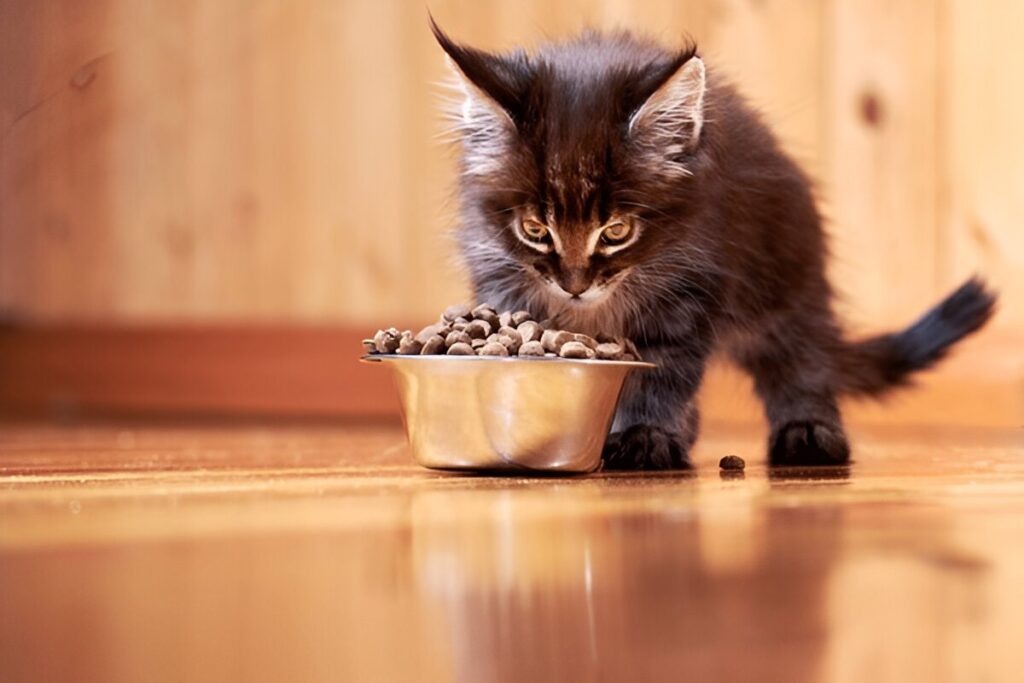
3. Fats: Why Fats Matter for Maine Coon Cats
A Maine Coon’s beautiful, luxurious coat is often a result of the proper mixture of fats, particularly healthy animal fats, in their diet.
Fats, particularly healthy animal fats and essential fatty acids, are important to the Maine Coon’s signature luxurious silky coat. Fats, in addition to their energy value, affect skin, coat shine, and coat health quality.
Here are ways fats are important
Essential Fatty Acids:
Maine Coons need omega-3 and omega-6 fatty acids sourced from salmon, fish oil and chicken fat to ensure their coats are soft, shiny and healthy. These fats achieve shininess but also promote skin health and combat inflammation.
Animal Fat in the Diet:
It should be noted that animal fat is a secondary source of energy for cats, and animal fat has nutrients that plant-based fats will not have. Animal fat helps balance the inflammatory response, adds shininess to the coat, and promotes skin repair.
Dietary Recommendations:
Feeding a Maine Coon a diet containing greater than 50% animal protein and up to 20% animal fat will help them maintain muscle mass and keep their coat straight, while reducing shedding and allergic skin issues.
Avoiding Deficiencies:
A deficiency in healthy fats can lead to a dry, dull coat. High-quality commercial foods or home made diets with large amounts of lean meat or seafood will help producers and owners provide appropriate fats in your Maine Coons diet.
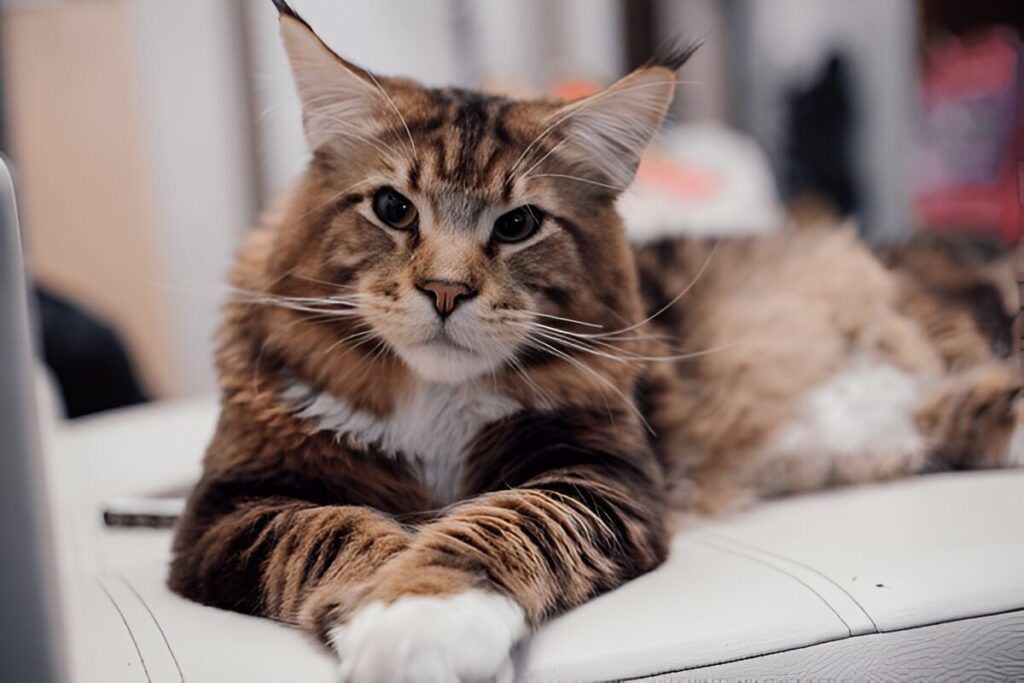
4. Carbs and Fiber: The Supporting Cast
Do Maine Coons Need Carbs?
Not really. Cats have no dietary need for carbs, but a small amount of fiber can help with digestion. Maine Coons, like all domestic cats, are obligate carnivores. Their bodies are built to sustain themselves by eating animal protein and fat.
Cats have no dietary requirement for carbohydrates; their prey-based diet in the wild has only trace amounts of carbs from the contents of their prey’s stomach.
Best Carb Sources (in small amounts)
- Pumpkin
- Sweet potato
- Brown rice
- Peas
Excess carbs can contribute to weight gain and diabetes, so I stick to meals primarily based on meat, with a small amount of fiber.
Fiber
Fiber does not form an important part of a cat’s ancestral diet, however, small amounts can be good for their digestive health. Fiber assists with bowel regularity, can help prevent hairballs, and assists with gut health.
In general, too much fiber in a cat’s diet decreases the protein content and is not well tolerated by all cats.
Common fiber sources in cat food:
- Beet pulp
- Cellulose
- Psyllium husk
- Fruits and vegetables (like pumpkin, sweet potato)
- Pea fiber, oat fiber, chicory root, inulin.
Key Recommendations
- Select foods with high animal protein, moderate fat, and minimal carbohydrate.
- Avoid foods with plant proteins or grains, potatoes, or legumes in the most significant part of the ingredient list.
- Make sure there is some fiber for digestive health, but it should also be a low percentage.
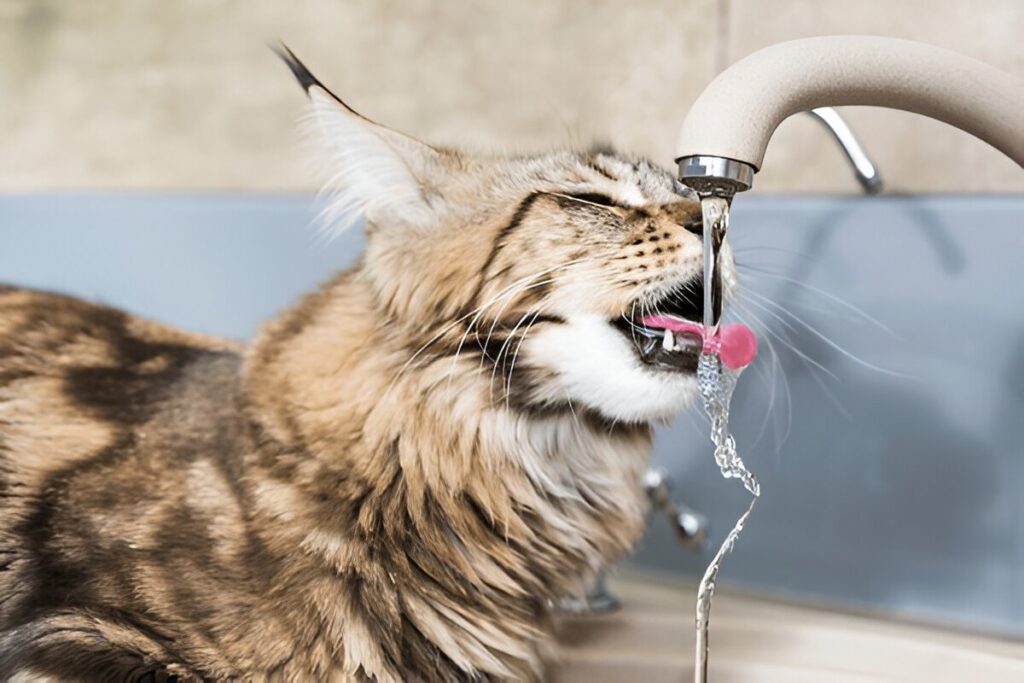
5. Hydration Is the Ultimate Super Nutrient
Hydration is a vital super nutrient for Maine Coon cats, serving a functional purpose for health and prevention of disease and conditions.
Water is responsible for many aspects of bodily function, including regulating body temperature, delivering nutrients, and removing waste and toxins.
Unique Hydration Needs of Maine Coons
- Maine Coons have a larger body mass and they possess a thick double coat, so they will need to utilize more water than their smaller cousins.
- Maine Coons’ active and energetic nature means they are prone to increased fluid loss during play and exercise and will therefore, require increased water intake.
How Much Water Do Maine Coons Need?
- The general recommendation is to drink approximately 30-40 ml of water per kilogram of daily body mass. For example, a 5 kilogram Maine Coon should drink approximately 150-200 ml of water daily.
- The amount per day will also vary with factors including their age, their activity level, their diet (wet or dry, moisture levels), and the climate they live in.
Encouraging Hydration in Maine Coons
- Multiple Water Sources: Water bowls or fountains are provided at multiple areas in your home or garden.
- Feed Wet Food: Wet or canned food items with higher moisture content will contribute to their hydration and replace fluids in their urinary system, while reducing the potential for higher urinary concentrations.
- Maintain Clean Water: Change their water often.
- Interactive Play: Encouraging activity (i.e., interactive play) could initiate thirst and consumption after the activity was completed.
6. DIY Diets and Homemade Meals
Feeding your Maine Coon a homemade or DIY diet can be fulfilling and customized for their needs, but you will need to plan to ensure a good balance of nutrition and safety.
Do Your Own Research
Since there are many choices, you should decide what’s best for your cat, not just follow what’s trending or popular.
- Talk to a veterinarian or feline nutritionist before feeding your cat homemade food to ensure it is healthy for your cat.
- You can find balanced recipes and pick out suitable supplements using reputable resources like the Balance It website.
- Read advice from reliable breeders, veterinarians, and scientists to learn about the advantages and disadvantages of both raw and cooked diets.
- Be careful about recipes you find online that do not include all the essential nutrients.
Homemade Meal Ideas
Raw Food Diets
If you go raw, make sure you include muscle meat, organs, and bone in your meals. I have fed Loki some pre-made raw foods, but he tends to be picky with his meals.
Cooked Homemade Meals
Place a whole chicken or fish in a pot with kale, spinach, green beans, peas, and squash. Take out the bones, blend the mixture to your liking, and add some beaten eggs for more protein.
Supplements for Home-Cooked Food
Always make sure that essential vitamins are not missing from your cat’s diet. Make sure to do these every time.
My Personal Experience
As a Maine Coon owner, I found that preparing homemade meals can be a great way to bond with your cat and cater to their preferences.
My Maine Coon especially enjoys a mix of cooked chicken and pumpkin, blended with a feline supplement for complete nutrition.
I found that cooking in bulk and freezing the portions helped me handle the process. I saw that their coats looked better and their energy increased, but it took me some time to figure out the right diet with the help of the vet.
Remember, every cat is different, so what works for one may not suit another.
My DIY Diet Considerations
| Aspect | What to Include | What to Avoid |
| Protein | Chicken, beef, fish, turkey | Low-protein/filler foods |
| Fats | Omega-3s, animal fats | Excessive plant oils |
| Veggies (optional) | Pumpkin, greens, peas, squash | Onions, garlic |
| Supplements | Taurine, vitamin/mineral premix | Skipping supplementation |
| Preparation | Batch cook, freeze, add supplements cold | Cooking with supplements |
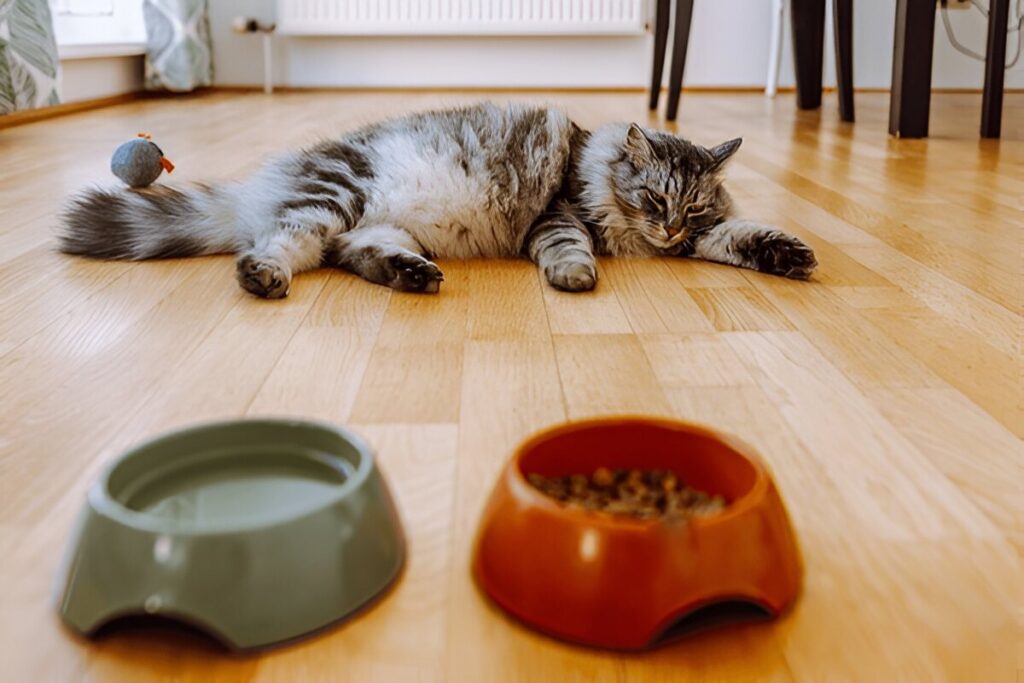
7. Portion Control Tips for Maine Coons
Maine Coons are large, active cats with higher caloric needs than many other breeds, but their size also makes them prone to overfeeding and obesity if not managed carefully.
How Much Should a Maine Coon Eat?
An adult Maine Coon typically requires between 24 and 35 calories per 500 grams of body weight daily, depending on activity level. For example, a 7 kg (15.4 lbs) Maine Coon may need roughly 336–490 calories per day, adjusted for exercise and age.
| Weight (lbs) | Daily Calories Needed |
| 10 | 300 |
| 15 | 450 |
| 20 | 600 |
| (Multiply cat’s weight by 30 for a rough estimate) |
Feeding Schedule
- Kittens: Free feed or small, frequent meals.
- Adults: 2–3 meals per day.
- Seniors: Adjust for lower activity and metabolism.
Portion Control Tips
The secret to healthy feeding is making sure your pet gets enough energy, eats the right amount, and gets quality food.
- Measure Meals: Always measure your Maine Coon’s food using a kitchen scale or measuring cup to avoid accidental overfeeding.
- Scheduled Feedings: Feed adult Maine Coons twice daily—morning and evening—to maintain a routine and prevent overeating.
- Avoid Free-Feeding: Keeping food open all day (free-feeding) may result in your cat overeating and gaining weight, which is more likely to happen if you have only one cat in your home.
- Monitor Treats: Treats should not exceed 10% of daily caloric intake and should be high in protein, low in fillers.
Final Thoughts
Feeding a Maine Coon is a journey, not a chore. Make sure your pet eats quality protein, healthy oils, and drinks enough water to keep it healthy for a long time. And remember—every Maine Coon is unique, so don’t be afraid to experiment (safely!) to find what works best for your furry friend.
Maine Coon Diet FAQs
Should I feed my Maine Coon wet food, dry food, or both?
Most cat owners are advised to mix wet and dry food for their pets. A combination of the two ensures they get the nutrients they need to support their big bodies and high energy levels.
How much should I feed my Maine Coon?
It is very important to control how much food you eat to prevent obesity. Adult Maine Coons typically need two meals a day, while kittens (up to 6 months) may require 3–4 smaller meals daily. Refer to the instructions on the packaging of your chosen food or ask your vet for the right amount to give your pet.
Are raw meat diets safe for Maine Coons?
Many Maine Coon owners explore raw meat diets due to their natural carnivorous instincts. If you choose a raw diet, make sure the meat is fresh, suitable for humans and has all the essential nutrients. Contact a veterinarian to ensure your pet gets the right nutrients
When should I switch my Maine Coon from kitten to adult food?
Maine Coons mature more slowly than other breeds. You should switch your kitten to adult food after nine months, yet some may need to continue with kitten food for 12–15 months based on how fast they grow.
What is the best diet for a Maine Coon?
Maine Coons are obligate carnivores, meaning they require a diet high in animal protein and healthy fats, with minimal carbohydrates. Meals for these pets ought to include quality meats such as chicken, turkey, fish (for example, salmon or tuna), rabbit, and beef, eaten in small amounts.
How often should I feed my Maine Coon?
Give your pets two or three meals throughout the day to prevent them from eating too much and to help their digestion.
References:
